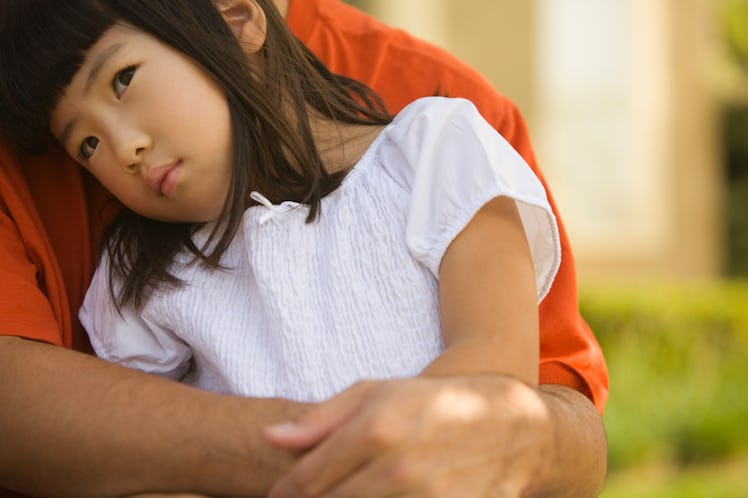How To Talk To Children About Death: The Right Words To Say
It might be the hardest conversation you have with your children, but it's also one of the most important.

Understanding how to explain death to a child is important. It’s one of the biggest, most existential questions parents must discuss with kids: What is death? What do you say to your kid when they ask, “What happens when you die?” or “Why do people die?” Is there a right way to explain death to a child?
Talking about death is complicated. And, really, there’s no easy answer for adults either. But as tough as it is, that doesn’t mean you shouldn’t try.
Death occurs in many ways — it can be anticipated, accidental, or sudden — and each instance and each encounter with grief is unique. So each conversation you have with kids about death will need to be tailored to the specific circumstances around a loss.
Age Should Dictate How You Talk to Children About Death
As with many tough topics, your kids might surprise you with how much they already know about death — and they’ll probably bring it up to you before you’ve even had a chance to start the conversation with them. According to the Child Development Institute (CDI), there are different stages children go through when starting to learn about and understand what death is — depending on their age:
- Preschool children
Kids aged 3 to 5 mostly see death as temporary, reversible, and impersonal. In stories they read or watch, characters who seem to die will often rise up again. It’s appropriate for their age level to think this way.
- Ages 5 to 9
At this age, most children begin to see that all living things eventually die and that death is final. But they tend to not relate it to themselves or consider the idea that they can escape it. They may associate images like skeletons with death. Some children may have nightmares about such images.
- 9 through adolescence
Older children begin to understand fully that death is irreversible and that they too will die someday.
Sign up for the Fatherly newsletter to get expert advice about fitness, gear, travel, style, parenting, and more in your inbox.
Removing Emotion Can Help When Talking to Children About Death
For a large part of childhood, death isn’t necessarily viewed in emotional terms. That’s why it’s usually easier to talk about death when you can be less emotionally involved yourself. Take opportunities to talk to children about dead flowers, trees, insects, or birds — it’s a way of teaching about death without the tragedy of personal loss. According to the National Institute of Health, a child’s interest in and distant exposure to death “may provide an opportunity to explain, for the first time, that all living things die and make room for new living things.”
But what about when Grandpa dies or the family pet passes away? When death hits personally, that same idea that “all living things die” can be a good place to start. Keeping the same, pragmatic, matter-of-fact truth at the root of your conversation can help bring peace when children grieve.
How to Explain Death to a Child
- Explain what death is: Everything that lives dies. You can introduce the concept with a mosquito (which totally had it coming) or even those houseplants that you forgot to water. Toddlers and preschoolers often need these words repeated to learn.
- Tell it straight, but don’t volunteer details: Presenting facts will keep their mind from running rampant with speculation that makes a difficult situation even worse.
- Don’t use phrases like “they are in a better place” or “they went away”: These white lies might be understood by your kid in a different way than intended.
- Instead of focusing on where the deceased are now, direct their thoughts to a happy place represented by memory about the deceased.
- The stages of grief don’t apply: In reality, the range of grief emotions is vast, erratic, and often counterintuitive, while some people skip certain emotions altogether.
- Channel emotions: If your kid is coming to terms with the loss of a loved one, invest in art supplies and maybe a few cheap mattresses to pummel. After all, who doesn’t want to punch death in the face sometimes?
Use Clear and Honest Language When Talking to Children About Death
According to the CDI, it’s best to avoid language such as, “Grandma went away,” or “Fido went to sleep,” because all of these white lies have a different meaning to your children in other contexts. To a kid, these associations can make them scared to go to sleep or afraid of parents or loved ones traveling or leaving them. It’s better to be upfront when there’s an experience of death so as to avoid creating more problems with everyday life.
Of course, language isn’t the only obstacle when it comes to death. Religion is a primary source of explanation and belief when considering the purpose and process of death. If you’re religious, a death can serve as a good opportunity to talk to your kids about why you have religious beliefs regarding death. If you’re not religious, it’s okay to say so. If your child asks why some people believe in heaven or hell, explain to them that it’s part of their belief — and be sure to explain why beliefs are important for people.
But regardless of your child’s question or experience regarding religion, science, or death, remember that it’s okay to not have all the answers. “It’s okay to say, ‘I don’t know’ to your kids,” says Wendy Thomas Russell, author of Relax, It’s Just God. “Sometimes the best answer you can give your kids is that it’s okay to not know all of the answers.”
This article was originally published on